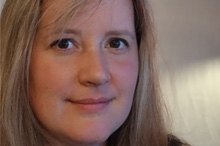
 Jodi Slick is being honored as a Champion of Change for her efforts as a Community Resilience Leader.
Jodi Slick is being honored as a Champion of Change for her efforts as a Community Resilience Leader.
Disasters are indiscriminate foes. For individuals, disasters don’t care if you have been diagnosed with cancer, are underwater on your mortgage, or plan to retire next week. For communities, disasters don’t wait until you’re ready, and they don’t come with an instruction manual.
I’ve witnessed the pain and frustration of disaster victims and recognize the years of difficult rebuilding ahead in our communities. If we are to build resilient communities, we need design thinking, integrated strategies, and strong partnerships to both mitigate the causes and adapt to the effects of climate change.
Climate change is real. The costs are high. The time to invest in resiliency is now.
My climate resiliency story began in 2008 when I attended an emergency meeting of community organizations to discuss the “heat or eat” dilemma many in our community faced during the winter. With an old housing stock, a very cold climate and an ever expanding energy affordability gap, it seemed that just triaging resources for the upcoming winter wasn’t enough.
I realized we needed to address the current emergency and also create integrated solutions that would make us more resilient to future energy price fluctuations and economic downturns. At that time, I was Executive Director of a social enterprise that led the implementation of green standards in low-income homes, and we were working on a national demonstration project that incorporated solar thermal systems into deep energy retrofits of foreclosed and blighted properties.
As much as I took pride in the work we were doing, I was bothered by the fact that our impact would be ten times greater if we were also increasing investments in weatherization and insulation for leaky homes. That fall, I assembled a cross-sector collaborative that created the Duluth Energy Efficiency Program (DEEP) and in 2011 founded Ecolibrium3 to administer DEEP and develop other community sustainability initiatives.
Ecolibrium3’s DEEP program helps residents of all-income levels by assessing their homes, prioritizing improvements, bundling available financial resources, contracting with trained and qualified companies, and conducting quality assurance through our one-stop shop. In our first two years, we helped more than 600 households complete efficiency upgrades, saving an average of $646 annually, and reducing GHG emissions by four tons per home. Over 65 percent of our participants complete advanced energy efficiency measures. DEEP is nationally recognized as an innovative, community-scale model for residential energy efficiency.
Building the DEEP process, however, is only the first part in our two-part story of community climate resiliency. The second part began after a 500-year rain event flooded the City of Duluth and seven counties in northern Minnesota and Wisconsin last summer. Ecolibrium3 had no experience in disaster recovery, but it was clear to me that the processes, capacity and cross-sector partnerships we built to bring energy efficiency to scale were the type of resources a community would need to rebuild. Without a FEMA Individual Assistance Declaration, and the infrastructure and funding that would have come with it, a local solution to provide recovery infrastructure became even more important.
When the Ordean Foundation chose to invest in flood recovery for low-income households, we rapidly retooled DEEP to meet these needs. Ecolibrium3 began reconstruction management weeks ahead of federal and state programs with a two-step process designed to dovetail with other disaster assistance. First, we helped families meet immediate winter preparedness needs of electricity, hot water and energy efficient furnaces using a bridge loan while residents waited for SBA or state assistance.
Once traditional disaster assistance was received and the bridge loan paid back, we reinvested the funds as a grant to complete advanced energy efficiency and flood mitigation measures that could not be covered by the disaster loans. Ecolibrium3’s flood-recovery model established standards for rebuilding that emphasizes energy efficiency and is saving some households more than $2,000 a year on heating costs. In addition, applying our third-party contract management system and extensive list of vetted contractors resulted in quicker rebuilding while protecting residents from post-disaster fraud.
Through Ecolibrium3’s work, I’ve learned that disaster recovery is a long and messy process. We still have families in need and it is essential that we find additional resources to help our region recover. It is equally important that we continue to invest in resilience by building community capacity and stronger systems before disasters strike.
Our climate mitigation and adaptation work would not have been possible without the dedication of the Ecolibrium3 staff and board, collaboration with the City of Duluth, support from the Ordean Foundation, Duluth Superior Area Community Foundation, Duluth Local Initiatives Support Corporation, US EPA Climate Showcase Communities, US DOE, MN Division of Energy Resources, MN Housing Finance Agency, and Freshwater Future, as well as the strong utility conservation programs available in our community through Minnesota Power and Comfort Systems.
Jodi Slick is Founder and CEO of Ecolibrium3.


